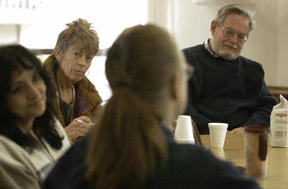When Jim Vaughan’s right leg first went numb in 1974, he thought it was just a virus.
It took six more years for a doctor to suggest a diagnosis, and seven more for Vaughan, who helps lead the multiple sclerosis support group on the island, to be convinced he had MS.
“I managed not to believe it until 1987, when MRI results made it conclusive,” he remembers.
What the magnetic resonance imaging revealed was scarring in the brain where the material that insulates the nerves, myelin, had been destroyed – the hallmark of MS.
At a time when no real treatment existed for the disease, Vaughan tackled his illness the only way he could.
“I went to an MS support group,” he said. “It probably saved my life.”
* * * * *
For those gathered on a recent Wednesday morning in the Winslow Arms meeting room, Vaughan’s story is a familiar – and a familial – one.
“We’re a very close group,” says Claire Smith, who facillitates the group’s meeting on Wednesday evenings. “We often have contact with each other. You know there are people here who will help you.”
Like a gathering of siblings, the group members spend the two-hour sessions discussing personal triumphs and medical problems in an atmosphere that’s friendly and chaotic.
Conversations ebb and flow around the table, as attendees exchanges ideas about the merits of different self-injection devices, best ways to use leg braces and discounts on handicapped parking.
“People used to go to MS groups and think they were depressing,” says one group member. “We aren’t depressing. This is a lively, supportive group, and we exchange a lot of information.”
At this meeting, aquatics instructor Diane Gilbert discuss the disability-friendly features of the new pool, including zero-depth entry, side-rails, flotation equipment – and a wheelchair donated by Vaughan himself.
“It’s expensive being disabled,” notes Vaughan, who eventually had to retire from his job as an engineer because of fatigue and reduced mobility caused by MS.
“I can afford the tools to keep myself mobile and independent – many people can’t,” he says.
Financial stresses are not the only frustrations that bubble to the surface. “A lot of people look at us and say, ‘there’s nothing wrong with these people,’” comments another group member. “Well, let them spend time in our shoes. It’s bad!”
Vaughan, who is now wheelchair bound, agrees that people with MS face significant challenges. “My needs are better taken care of because they are visible,” he notes, “Still, I’d like to have more sidewalks, because right now I drive the wheelchair in the middle of the street.”
Vaughan is encouraged that public awareness of the disease, recently a storyline on the popular television show, “The West Wing,” is improving, as are medical options.
Still, he emphasizes, a positive attitude and regular contact with others with MS are central to surviving the disease.
“What other choice is there? MS does what MS does and life does what life does; you have to go on.”
*****
Bainbridge’s evening MS support group meets 6:30 p.m. tonight at the Senior Center. Information: 780-4459 or nkmssg@bigfoot. com.



